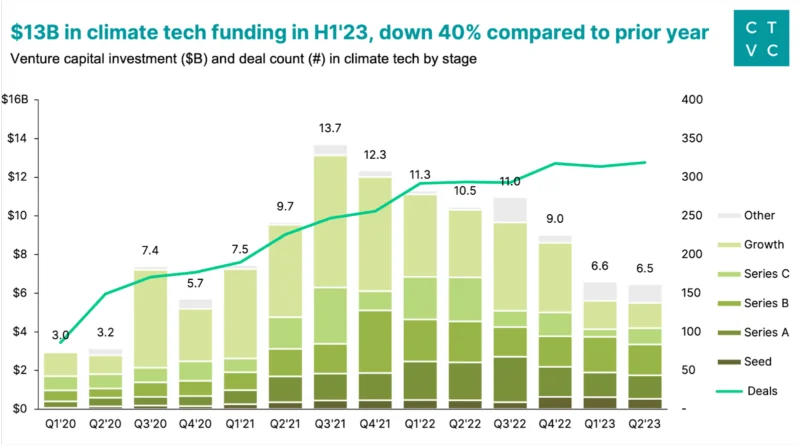New Product Launch: ClimateLens Monitor Yield Outlook - see regional and location-specific yields on key commodity crops, updated weekly. Learn More
Himanshu Gupta • August 7th, 2023.
Climate tech companies are making huge strides in the innovation of sustainable climate technology. Even through the ups and downs of big tech in recent years, climate change tech investments remain strong, seeing a 3750% increase in investment over the seven-year period of 2013-2019.
This article spotlights some of the brightest and best climate tech companies of 2023; companies that are expanding the horizons of climate tech and paving the way for a more resilient future.
Before we get into our climate tech superstars, let’s clarify what’s meant by climate technology.
Climate technology is any system or machine that fights climate change by reducing greenhouse emissions or mitigating the effects of global warming. Climate tech companies either provide ways to reduce negative environmental impacts or adapt to the current, unavoidable consequences. The most basic example is a renewable energy company that produces solar panels or hydropower systems.
We’re at a pivotal moment, where climate change can be lessened if we act now, but to a certain extent, we must deal with the damage we’ve caused before it can be reversed.
Since the 2015 Paris Agreement that encourages international cooperation to combat climate change, there’s been a surge of enthusiasm surrounding sustainability and climate mitigation. The widely recognized sense of urgency around global warming’s immediate impacts gave way to a slew of climate change companies eager to join the battle.
Every environmental threat from toxic pollutants to greenhouse gas emissions is seeing technological innovations, followed by considerable investments in the most promising and influential.
What better way for capitalism to become self-sustaining than the coming together of innovators and investors to reach the common goal of climate change resilience? The industry is growing exponentially, with great minds collaborating in a way that’s changing the world for the better – not just better for their wallets.
Climate tech companies encompass a broad range of fields, including renewable energy, carbon capture, energy storage, and sustainable agriculture. The diversity of fields being studied makes us excited for a strong, low-carbon future economy.
ClimateAi has been a mover and shaker among climate tech companies, using AI to facilitate unprecedented climate forecasting since 2017. From the agricultural sector to supply chain and public policy, businesses can use this technology to identify risks years in advance and protect their assets. The goal is to secure a climate-proof future without food insecurity or harsh blows due to climate-related instability.
More recently, ClimateAi raised $22 million in Series B funding after 4x-ing its customer base and receiving numerous accolades including the 2022 Best Invention of the Year for TIME’s sustainability category. The new resources will facilitate expansion into new terrain, including developing countries in the global south, Japan, and India — areas that are feeling the impacts of global warming with severity. Read more here.
Clean energy, also known as renewable energy, produces little to no greenhouse gasses and therefore is the main focus of many climate and environmental startups.
ClimateAi’s energy-focused platform gives energy companies, both sustainable and natural gas-based, the opportunity to get ahead of changing weather trends. The advanced climate technology can model wind speed outlooks, projected energy consumption levels, utility rates, and more.

Carbon dioxide, methane, nitrous oxide, and sulfur dioxide – the gasses emitted during goods production are the principal contributors to global warming.
The relationship between technology and climate change is now being flipped; whereas growth used to mean more greenhouse gas emissions, it can now mean the reduction of them. Climate tech companies are creating new ways to decrease pollution and filter out pollutants, helping businesses work toward the shared goal of lower global temperature averages.
The challenge of recycling is making it profitable enough for companies to partake in. Regardless of the positive externalities, businesses won’t recycle if it hurts their bottom line, as has been the case for decades.
Climate tech companies in the waste reduction realm are finding ways to make recycling help rather than hurt profits. Long term, this will save energy and natural resources.
Agritech and climate companies are putting their heads together to not only reduce greenhouse emissions but to protect the global food supply from the perils of climate change. Using agriculture risk management tools like ClimateAi, growers can achieve market stability and maximize yields with advanced machine-learning climate forecasting tools. Other innovations include aeroponics and hydroponics, which grow plants without the need for soil, preventing deforestation and soil degradation.

Combining business intelligence and sustainable values, green tech companies are using climate change mitigation to create new, profitable business opportunities.
Take consumer goods, for example. If average summer temperatures are expected to increase, the demand for items like beach umbrellas, ice cream, and swimming pools will rise. Merchants can use climate-based demand planning software to forecast the necessary inventory levels needed to meet future demand.
When it comes to meeting global sustainability goals, carbon capture is high on the docket of conversation. Climate change companies across the globe are racing to create the best carbon capture technology that not only stores CO2 but can convert it into a safer form or reuse it as a power source. A successful green tech company can partner with big oil and power plants to reduce carbon emissions and allow them to claim climate-friendly practices
Geoengineering is the manipulation of climate systems to soften the impacts of climate change. Engineers and climate tech companies are involved in advanced carbon engineering and solar radiation management (SRM) efforts that slow the greenhouse gas effect. UV rays can be diverted back to space, and carbon can be removed from the air by aforestation or underground storage. Such innovations are promising, demonstrating how we can change the conversation around climate change and technology.
Storms, flooding, pipe bursts, droughts, and sewage spills pollute drinking water reserves and threaten access to safe, potable water. With the increasing severity of natural disasters, water management software is helping to predict events that will put water reserves at risk. We can even use the tools for predictive maintenance, warning of insufficient infrastructure and weak links before a disaster occurs.
Efforts in water sustainability bolster seasonal and long-term water security, with climate change companies like ClimateAi using machine learning to achieve more accurate predictions than ever.
Afforestation means establishing a forest or vegetation in an area where there was no forest or woodland due to deforestation, urbanization, or natural disasters. Governments take part in afforestation to improve carbon capture and reduce greenhouse gas emissions, things that were directly facilitated by centuries of deforestation.
By supporting these initiatives with smart technology, climate tech companies can speed up the creation of these carbon sinks and add oxygen to the atmosphere. Other green tech companies use afforestation to combat soil erosion and the loss of biodiversity being experienced worldwide.

Let’s take a look at the best climate tech companies to watch in 2023. These innovators are on the frontlines in terms of tackling climate change in just about every industry. We’ve included some climate change start-ups and more established businesses.
While climate tech companies are seeing exciting and significant attention from investors, the capacity needed to fully address the issue of climate change is still far away. Major challenges to the climate technology sector include growth initiatives and scaling; startups are struggling to find talent and get sufficient funding needed to scale.
At any rate, platforms like ClimateAi are redefining green tech and how it relates to broader business objectives. Let’s take a look at how the industry is facing these challenges head-on.

In many industries, those who came before us have laid the groundwork of standard operations and roadmapping. On the contrary, there is no historical climate technology development process in the context of a rapidly approaching threat. In this way, innovators are inventing the wheel as they go, requiring flexibility and some level of leeway in terms of R&D.
On the theme of R&D, another setback is the uncertainty of success that leaves investors weary. When there’s no precedent or proof of success, it’s harder to get the funding needed to achieve that success.
Consider some of the goals and promises of climate technology companies — to contribute to greenhouse gas reduction, increase accessibility to clean energy, or normalize eco-friendly habits. Such business objectives, though noble and highly necessary, are difficult to attain financing for because of hard-to-measure results and long waiting periods.
Capital is expensive, considering many ideas are the first of their kind, and stakeholders must be patient, with sustainability goals sometimes spanning decades. While some climate change software generates immediate returns, many have farther horizons.
More positively, climate tech stocks perform well and are generating more and more buzz as investors see success.
Climate change technology companies are facing stringent and complex regulations, hindering growth in many places. For example, markets remain fragmented across city, state, and international borders, making it hard to scale and manage costs. Climate startups in the carbon capture market face irregular pricing and a lack of consistency, restricting innovation and spooking investors. It is hoped that policy gets ironed out as the climate tech industry grows and requires more thorough regulatory procedures.
Being a relatively new sector, companies working on climate change find it hard to attract skilled talent with valuable experience. Firms have a relatively small talent pool to pull from, especially when you consider the scope of climate-related goals. For climate tech companies, it’s important to must find individuals with interdisciplinary backgrounds and seasoned critical thinking skills.
Continuously, climate tech companies are producing new, smarter ways to resolve and cope with future climate predicaments. From aforrestation to renewable energy, companies working on climate change have birthed creative and game-changing ideas.
Among this bunch is ClimateAi, climate risk management software allowing firms to forecast climate events on a seasonal or decades-long basis. In the present, companies can stay ahead of the curve to avoid disruptions. Long-term, the tool allows them to create sustainable, resilient business practices based on world-class data.
Overall, climate tech companies are revolutionizing the agricultural, manufacturing, and transportation industries with novel insights into sustainability measures. By creating new solutions and generating unexplored research findings, we can get a firmer grasp on issues like water management and food security.
At the forefront of these measures, ClimateAi’s risk management tools provide a new approach to the cause. Businesses can use advanced forecasting to turn climate change risks into advantages. As a leading agriculture technology service provider, we’ve helped the agri-commodity sector protect assets and improve bottom lines with simple, user-friendly technology.

Though climate tech stocks are seeing increased attention, the top climate-friendly industries that could reduce emissions by 80% received only 25% of investments between 2013 and 2021. That’s a ton of untapped potential being sat on.
Investing in climate tech companies not only is an investment in humanity, but can even deliver quantifiable gains. Some research suggests that portfolios based on carbon efficiency can generate outperformance between 3.5% and 5.4% per year.
Of course, investors of all sizes should research the company, industry, and outlook before investing solely because of a company’s do-good factor. However, public climate tech companies give investors the chance to make money and contribute toward global goals simultaneously.